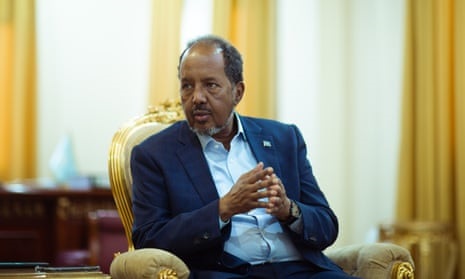By Ahmed A. Yusuf
Just after midnight on Sunday, an emergency meeting was hastily convened at Villa Somalia. President Hassan Sheikh Mohamud summoned the heads of Mogadishu’s security apparatus following a brazen twin attack: mortar fire struck both the heavily guarded Presidential Palace and Aden Adde International Airport, the symbolic and logistical nerve centers of the Somali state.
The meeting, marked by tense exchanges and presidential fury, reflected the government’s inability to control escalating insecurity in the heart of the capital. According to reliable sources, the president was visibly angered as he interrogated the security officials about their failure to preempt the attacks or identify those responsible. “How can bombs fall this close to the palace and airport, and yet you don’t even know where they came from?” he reportedly asked, pounding the table in frustration.
But for many Somalis, the president’s fiery rhetoric is all too familiar — and largely performative. Despite similar crises in the past, no meaningful change has emerged from such meetings. The root of the problem, critics argue, lies not in poor intelligence or operational lapses, but in a deeper leadership failure — starting with the presidency itself.
A Disturbing Pattern: Nepotism Over Merit
In a stunning and controversial shake-up, President Hassan Sheikh recently dismissed General Hassan Dhicis, one of Somalia’s most experienced and respected military commanders. A seasoned strategist with a distinguished record in counterterrorism, General Dhicis had served as the head of the presidential guard under two successive presidents. What shocked many within security circles even more was the quiet appointment of the president’s own son and a relative as Chief Commander and Deputy Commander of the Presidential Security Battalion—an abrupt move that bypassed standard military protocol and has reportedly dealt a heavy blow to morale within the armed forces.
“It’s not just unethical — it’s dangerous,” said a retired officer who served under General Dhicis. “You cannot fight an enemy as adaptive and ruthless as Al-Shabaab with family connections. General Dhicis had the trust of his men and an encyclopedic knowledge of insurgent tactics. You don’t throw that away for loyalty.”
The personnel reshuffle came at a time when Mogadishu is facing its worst security deterioration in years. Since February 2025, there have been a series of coordinated Al-Shabaab strikes targeting not just government installations, but also civilian hubs, aid convoys, and airport infrastructure.
Terror in the Skies and a Humiliated Government
Al-Shabaab’s latest provocation included a propaganda video filmed inside Mogadishu — showing their militants calmly launching mortar rounds and then dispersing unbothered. The video, shared widely across Somali social media platforms, sent shockwaves across the country. More than just a tactical victory, it was a psychological one: an open challenge to a government struggling to convince its citizens it is in control.
On the international front, the ramifications were immediate. A Turkish Airlines flight enroute to Mogadishu was forced to abort its landing and return to Ankara via Djibouti after intelligence reports flagged immediate threats near the airport. Onboard the flight was none other than the Governor of Banadir Region, Mr. Amir, who had just returned from un official visit to the United Kingdom. His inability to land on Somali soil was a symbolic embarrassment for the federal government and a logistical disruption that underlined just how vulnerable even Somalia’s most fortified zones have become.
President Hassan Sheikh reportedly instructed Governor Amir to return to the country immediately, demanding his presence for urgent security consultations. But critics argue that such displays of urgency only emerge after the fact — when the damage is already done.
Same Speech, Different Day: A President in Denial?
Observers of Somali politics point out that President Hassan’s response to these latest events follows a predictable pattern. When faced with crises — whether political, economic, or military — he delivers impassioned speeches, lectures subordinate, threatens dismissals, and vows sweeping reforms. But little changes on the ground.
“It’s a script at this point,” said a veteran journalist in Mogadishu. “He gets angry, makes promises of accountability, and disappears until the next disaster. There is no sustained follow-up, no clear plan, and certainly no sense of responsibility at the top.”
Indeed, despite weeks of growing discontent within the security ranks and several internal warnings about rising threats, the president appears to have ignored calls to reinforce frontline units or improve community-level intelligence gathering. Instead, he continues to centralize power among family members and loyalists, sidelining experienced professionals.
Mounting Pressure as the NCC Meetings Resume
This latest security debacle comes at a critical political juncture. The National Consultative Council (NCC) meetings, which bring together federal and regional leaders to negotiate sensitive national issues, have just resumed in Mogadishu. But the president’s political capital is wearing thin. Many federal member states — particularly Puntland, and Jubaland — have already distanced themselves from Villa Somalia over what they perceive as President Hassan’s unilateralism, his tampering with the constitution, and now, his disastrous security management.
For these regional leaders, the bombing of the capital and the failure to protect even the seat of government is further evidence that the federal administration is out of its depth. “How can we trust Mogadishu to lead a national security plan when it can’t even protect its own backyard?” asked a senior aide to a federal state president.
A Country at the Brim
As Mogadishu reels from yet another symbolic and operational defeat, the president’s options are narrowing. The public has grown weary of his fiery speeches, the military is demoralized by political interference, and international partners are increasingly skeptical of Somalia’s ability to stabilize under his leadership.
The tragedy is not just the security breakdown, but the missed opportunity for reform. If President Hassan Sheikh continues to prioritize loyalty over merit, and blame over responsibility, then Somalia’s hard-earned security gains risk unraveling — and the capital may remain, quite literally, under fire.
Ahmed A. Yusuf
Email: aayuusuf44@gmail.com


Leave a Reply